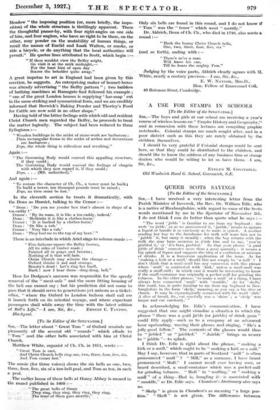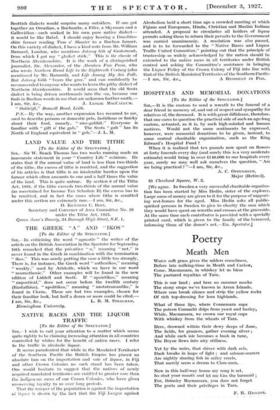QUEER SCOTS SAYINGS [To the Editor of the SPECTATOR.] SIR,—I
have received a very interesting letter from the Parish Minister of Inveresk, the Rev. Dr. William Edie, who is a native of Roxburghshire, with regard to some of the Scots words mentioned by me in the Spectator of November 5th. I do not think I can do better than quote what he says :— " The word jirble ' is familiar to me from my boyhood : the verb to jirble,' or as we pronounced it, jairble,' means to agitate a liquid or handle it so carelessly as to make it splash. A mother sending her boy to the farmhouse for milk will warn him not to jaikblie ' it, but carry it steadily : when the boy returns with the milk she may have occasion to elide him and to say, you'Ve jairbled it,' or it's been jairbled.' So that your phrase a guid jirble of drink ' connotes more than a good quantity : it means a big splash of liquor and suggests the idea of a confusion or mixture of drinks. It is a humorous application of the term. As for making a kirk or a mull,' should this not simply be a mill' Y I don't think that a snuff-mull has any connexion with this phrase where mull ' is contrasted with kirk,' unless a snuff-mull was really a snuff-mill : in which case it would be interesting to know if the snuff-container was originally a pocket-mill for grinding the tobacco. In the other phrase, to make a mull ' of a thing, I have always here connected mull' with muddle.' As for skelb,' this word, too, is quite familiar to me from my boyhood in Rox- burghshire in the form `-skelp,' meaning, as you say, a big slice or chunk. It may be etymologically connected with the word ' slab.' A slice of bread, &c., cut carefully was a `chive' ; a • skolp ' was larger and cut carelessly.' " In acknowledging Dr. Edic's communication, I have suggested that one might visualize a situation to which the phrase " there was a guid jirble (or jairble) of drink gaun " could fitly apply—such as to a company at an advanced hour upstanding, waving their glasses and singing, " He's a jolly good fellow." The contents of the glasses would thus be " jirbled " or " jairbled." " Jairble " brings us nearer to " jabble "—to splash.
I think Dr. Edie is right about the phrase, " making a kirk or a mull," which ought to be " making a kirk or a mill." May I say, however, that in parts of Scotland "mill" is often pronounced " mull " ? " Mill," as a surname, I have heard pronounced " Mull." I cannot recall ever having seen, or heard described, a snuff-container which was a pocket-mill for grinding tobacco. " Mull " in " mulling," or " making a mull " of a thing—that is, bungling it—is associated with ' " muddle," as Dr. Edie says. Chambers's Dictionary also says SO: Skelp " is given in Chambers's as meaning " a large por- tion." " Skell " is not given. The differences between Scottish dialects would surprise many outsiders. If one got together an Orcadian, a Buchanite, a Fifer, a Skyeman and a Gallovidian—each soaked in his own pure native dialect— it would be like Babel. I should enjoy hearing a Dumfries- shire farmer reading Tam o'. Shanter to a Buchan farmer. On this variety of dialect, I have a kind note from Mr. William Barnard, London, who mentions Johnny Gib of Gushetneuk, from which I got my " glaiket stirk." This is the classic of Northern Aberdeenshire. It is the work of a distinguished journalist, Dr. Alexander, of the Aberdeen Free Press, who also wrote Northern Rural Lifein the Eighteenth Century '(also mentioned by Mr. Barnard), and Life Among My Ain, Folk. But Johnny Gibb " bears the gree," and can confidently be recommended to anyone who wants to learn the pithy dialect of Northern Aberdeenshire. It would seem that the old Scots dialect is being driven northwards into the tea, because one finds in Buchan words in use that are unknown further south.— P.S.—By the way, another expression his recurred to me, used to describe persons or domestic pets, fastidious or finicky about their food, namely, " nice-gabbit." Everyone is familiar with " gift o' the gab." The Scots " gab " has its North of England equivalent in " gob."—J. L. M.











































































 Previous page
Previous page